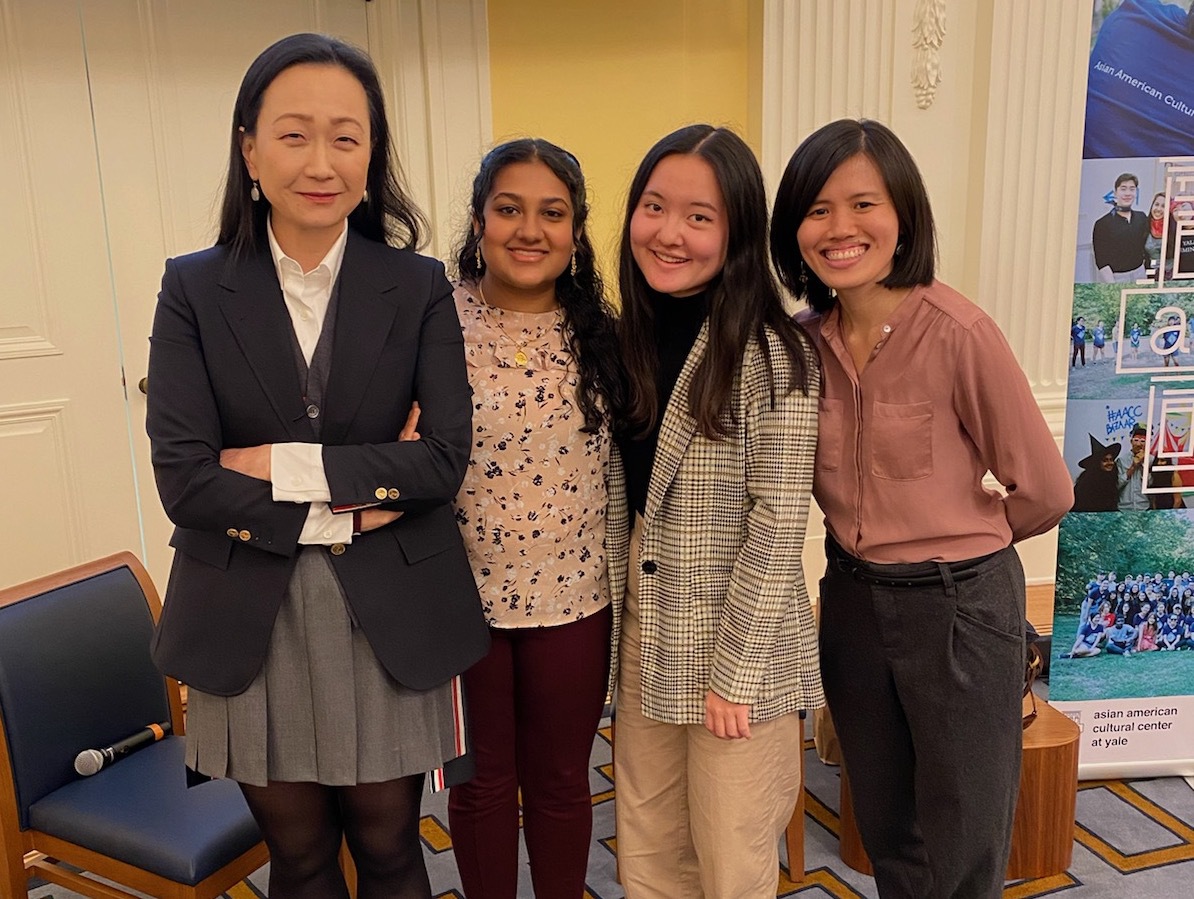AACC hosts author Min Jin Lee ’90 in alumni speaker series
This past Tuesday, Korean American author Min Jin Lee spoke to Yale students about her life and career.

Yeji Kim, Contributing Photographer
Outside the Presidents’ Room at the Yale Schwarzman Center, students stood in a long line, clutching their copies of “Pachinko” with eager whispers and exclamations when they saw Min Jin Lee ’90.
Lee, the author of “Free Food for Millionaires” and the New York Times bestseller “Pachinko,” came to visit Yale this past Tuesday. The event was sponsored by the Asian American Cultural Center and featured a speech by Lee followed by a moderated question-and-answer panel.
“One thing Yalies can learn [from the event] is the many different ways you can approach life after Yale,” Sanya Nair ’24, one of the coordinators of the event, told the News, taking into consideration how Min Jin Lee left her legal career for writing. “There are a lot of different paths to pursuing a career you are passionate about.”
The event was organized by the alumni engagement team at the Asian American Cultural Center and was moderated by Alumni Engagement Coordinators Nair and Vivian Zhao ’24. Nair and Zhao helped secure the space from Commons, prepare the script, design graphics and manage participants. Joliana Yee, assistant dean of Yale College and director of the AACC, was the one largely in communication with Lee.
Nair and Zhao first came up with the idea for the talk when they decided to read “Pachinko” together, as they were interested in the “hype” around it. After finishing the book and upon noting that Lee is an alumna, the two asked Yee if it would be possible to host her.
“We honestly weren’t expecting her to respond,” Nair said. “We are so grateful that she did and was able to come for the event.”
The event started off with a short speech from Lee, who spoke about her transition from South Korea to life in America, with anecdotes about the trials and tribulations of learning how to speak confidently in English.
“I didn’t want to talk,” Lee said. “I didn’t want anyone to think I was stupid.”
Lee started to understand rhetoric through various public speaking classes during the summer at schools around the country.
“When I went to Yale for college, I felt outclassed by my peers who had attended the private schools I had visited only during the summertime,” she said. “They spoke with ease, about music and art, and faraway places and they wrote beautiful papers about books I had not yet read … I stumbled through my classes.”
Lee ended her speech by discussing a fear she has that she described as “not rational not fair”: that if she messes up, others like her might not be asked for these sorts of opportunities.
The event then transitioned to the question and answer session, moderated by Nair and Zhao.
When asked about her time at Yale, Lee stated that she had “a hard time.” However, her passion for learning and academics shone through, as she would use spare money she had to purchase books to read for classes she did not have room to take.
Lee also spoke about her involvement with Asian American activism. She cited a specific example of when she and her friend wrote a letter to the parents of every Korean student at Yale, with the intention of establishing Korean classes. They mailed these letters to all of these parents and ended up acquiring a large donation. The year after Lee graduated, Korean classes began at Yale.
“It’s very clear she’s thought about identity as an Asian American woman, for herself personally, but also as a writer,” Zhao said. “It’s a discussion a lot of people attending would be interested in.”
Activism is a large part of Lee’s life, and she encourages those who feel despair at certain social issues — specifically citing the rise of violence against Asian and Asian Americans — to engage in small acts of activism on a day-to-day basis.
“I think it would be deeply unsatisfying to me if I was only caring about my own family,” Lee told the News. “This is where all of us, if we believe in service, take our knowledge and our power and also help other people besides our own. That makes us more powerful.”
This event forms a part of the Life After Yale Alumni Speaker Series, a series for Yale students to hear about the lives and careers of alumni after graduation. While the AACC was involved with the main planning, the event was co-sponsored by the Yale English Department, the Yale Office of Career Strategy, Poynter Fellowship in Journalism at Yale and the Yale Schwarzman Center.
“The Life After Yale series is really emblematic of the work that we do,” Nair said. “We have a lot of different settings where Yale students can engage with cool Yale alumni in different facets.”
Lee previously spoke at a Davenport College tea in 2018.
Correction, April 17: This article previously incorrectly described Professor John Witt’s involvement and referred to Yee as an associate dean, not an assistant dean. It has been updated.







